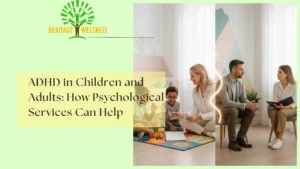Introduction
Attention Deficit Hyperactivity Disorder (ADHD) is more than just difficulty focusing; it’s a neurodevelopmental condition that can impact multiple areas of life, from relationships to work productivity. For many adults and children living with ADHD, the symptoms can feel overwhelming without proper support. Therapy plays a vital role in helping individuals manage these challenges effectively, leading to significant improvements in overall quality of life.
Whether you’ve recently been diagnosed or have been managing ADHD for years, seeking therapy could be the game-changer you need.
Understanding ADHD and Its Challenges
ADHD is often characterized by symptoms such as:
- Difficulty concentrating
- Impulsivity
- Restlessness or hyperactivity
- Disorganization
- Emotional regulation challenges
These symptoms can affect academic performance, work efficiency, self-esteem, and even social interactions. Without professional help, individuals may find themselves stuck in cycles of frustration, missed opportunities, and stress.
How Therapy Helps Manage ADHD
Therapy doesn’t “cure” ADHD; rather, it equips you with tools and strategies to better manage symptoms. The most common types of therapy for ADHD include:
1. Cognitive Behavioral Therapy (CBT)
CBT helps individuals reframe negative thought patterns and adopt practical coping strategies. For ADHD, it can target procrastination, time management, and self-criticism.
2. Behavioral Therapy
This type focuses on modifying specific behaviors through reward systems and structured routines, which can be especially helpful for children with ADHD.
3. Coaching for ADHD
ADHD coaches provide guidance on organization, goal-setting, and accountability, helping individuals translate therapeutic concepts into real-world success.
4. Family Therapy
For children or teens, involving the family helps build a supportive home environment with clear communication and boundaries.

Benefits of ADHD Therapy for Quality of Life
1. Improved Focus and Productivity
Therapy provides practical techniques to minimize distractions, break tasks into smaller steps, and create an environment conducive to focus.
2. Emotional Regulation
ADHD often comes with mood swings, irritability, or frustration. Therapy can help individuals identify triggers and respond calmly rather than react impulsively.
3. Stronger Relationships
By learning communication and listening skills, individuals with ADHD can reduce misunderstandings in personal and professional relationships.
4. Better Time Management
Tools like planners, alarms, and task-prioritization methods are often introduced in therapy to help individuals stick to schedules and meet deadlines.

5. Higher Self-Esteem
Overcoming the daily challenges of ADHD with professional support fosters a sense of achievement and confidence.
The Long-Term Impact of ADHD Therapy
One of the most powerful benefits of seeking therapy is its long-lasting effect. With consistent effort, individuals often find that skills learned in therapy become second nature, reducing the stress associated with ADHD symptoms. This translates into better job performance, healthier relationships, and a greater sense of fulfillment.
Overcoming Stigma Around ADHD Therapy
Unfortunately, some people hesitate to seek therapy because of misconceptions about ADHD or mental health treatment. It’s important to recognize that ADHD is not a character flaw or a result of laziness—it’s a neurological difference that requires tailored strategies for success. Therapy is not a sign of weakness but a proactive step toward improving life quality.
Combining Therapy with Other ADHD Management Approaches
While therapy is highly effective, it often works best when combined with other ADHD management strategies, such as:
- Lifestyle adjustments (exercise, healthy diet, adequate sleep)
- Mindfulness practices (meditation, breathing exercises)
- Educational support (academic accommodations for students)
When these methods are used alongside therapy, individuals often see even greater improvements in daily functioning.
How to Choose the Right Therapist for ADHD
Finding the right therapist is crucial. Look for professionals who:
- Have experience in ADHD-specific therapy
- Use evidence-based approaches like CBT
- Offer practical, solution-focused strategies
- Create a safe, non-judgmental space for open communication
Final Thoughts
Living with ADHD can feel overwhelming, but it doesn’t have to define your life. Seeking therapy empowers you to take control, learn effective coping mechanisms, and unlock your full potential. By improving focus, emotional stability, and productivity, therapy can truly enhance your quality of life. Contact us today!






